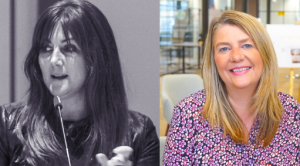
Half of women in the UK fear equality has taken a huge step back in time since the start of the pandemic. With women more likely to be furloughed, at risk of redundancy and carrying the burden of most of the domestic and home schooling tasks, studies show women are increasingly fearful of the future. Some say there’s a risk that gender equality could go into reverse and the hybrid work model could widen existing socioeconomic inequalities, hinder inclusivity, diversity and equality efforts and ultimately regress female leadership.
Since the merger of Fluxx and magneticNorth earlier this year, we now have two brilliant female leaders on our Board who both know a thing or two about leading in a crisis. Fluxx and magneticNorth’s Chief Executive Officer Jenny Burns is PR Week Comms Personality of the Decade and has over 20 years of experience in Senior Corporate Communication roles making transformational and innovative changes in complex businesses like O2, RSA, British Gas and Barclays Bank. Chief Creative Officer Lou Cordwell OBE is founder of magneticNorth, Chair of Greater Manchester’s Local Enterprise Partnership and a passionate campaigner for gender equality in business and tech industry.
J: At times of crisis, our instincts tend to tell us to be reactive or do nothing and hope the disruption passes. Leaders need to fight all those instincts; pause, get the right people involved, get a plan in place then act decisively and communicate openly.
Communicating with purpose is especially important in times of crisis where people need leaders to be authentic, visible and approachable. It’s not about overwhelming people with all the information available; it’s about giving people what they need, when they need it.
Never waiver from your values. Protect your business interests with your people and clients at the forefront — they need understanding, empathy and support too. If you remember your values it will guide what you say and do, thus protecting and upholding your reputation.
L: Good leaders make quick decisions. They process all the available information, then determine what matters most in order to make the right decisions. They act boldly, with conviction. It’s ok to admit to not having all the answers, it’s about getting input from a range of sources and then bringing in expertise from the outside when you know which questions you don’t have answers to.
L: Without doubt. The pandemic has shown leaders that they need to get comfortable with uncertainty and this trend will continue as we navigate all the changes in our work and home life that are happening post-pandemic. The two have collided and we’ve all become more human as a result — we’ve become unapologetic and real about our home lives and after seeing each other’s homes, families and pets we’re now a lot closer to co-workers and our people. The way we engage with one another is more authentic and the work mask has well and truly come off. Now that’s happened you can’t come back from it and leaders will need the skills to manage that intimacy and empathy and if they get it right it will be great for working culture.
J: I absolutely agree and would add that legacy leadership is dead. Based on old ideas and tools — the pandemic, along with accelerated digital adoption has seen the dawn of a new era of leadership — and it’s a place where presenteeism is no longer a thing. Research on leadership in the digital age reveals that certain qualities such as deep domain expertise, decisiveness, authority and short-term focus are giving way to softer skills and a number of agile leadership competencies will be needed to navigate the hybrid workplace; humility, adaptability, purpose, communication and empowerment.
L: It’s been well reported that the pandemic has affected women and men in different ways, with women bearing the brunt of childcare and domestic chores, needing more time off work (often with no pay) and are more likely to be furloughed or face redundancy. And with gender pay gap reporting cancelled for 2020 and delayed this year — things are not looking good. On the flip-side, it’s also given rise to a more flexible hybrid working culture that, if done right, creates an exciting opportunity for everyone to flex and choose their working environment that could complement both work and home life.
J: From our research we’ve found there’s a risk the hybrid work model could widen existing socioeconomic inequalities. As we transition from fully remote to hybrid, we may lose the sense of equality created in the last 18 months or worse, we’ll create divided cultures and second-class citizens. We must work hard to maintain inclusivity by implementing some clear and shared principles and rituals. Everyday meetings will have a mixture of online and offline workers, so good digital facilitation will be key in ensuring everyone’s opinion is sought and heard to maintain high engagement and good quality decision making.
If you’d like to know more thoughts on Hybrid working and whether it will help or hinder equality — check out Hybrid working — will it help or hinder.
L: Don’t let your inner voice hold you back and do everything you can to overcome that confidence barrier. There’s never a perfect time to share an idea, take a chance or start a business, don’t let intrusive thoughts and confidence hold you back. Find your community and support network and be the change women need in business.
J: My advice is don’t be intimidated by the male dominated environment we find ourselves in — you don’t need to become an alpha-female. You don’t have to be masculine to be successful. Women are important for diverse reasons and should harness their unique skills and capabilities. For example, empathy and emotional intelligence are typically female traits and both are really important for connecting with people and customers. As soon as you become an alpha-female, you’ve lost the whole reason we need women in senior roles.
J: Any short-term decisions leaders make now need to be well thought out and made with evidence as they’ll have long term implications on a business and its people. We’re currently working with a number of businesses to unlock exciting opportunities presented by the new world of work; building resilient workforces, fostering togetherness and reimagining employee experience are huge areas that need addressing as we move into a hybrid world.
L: The pandemic has presented an opportunity to do things differently; it’s up to us to shape what that future looks like. For example, WFA means organisations will have access to a larger, more diverse workforce; leaders will have to work out how to attract and retain top talent. We’re seeing organisations set ambitious Net Zero targets — but we still need a realistic plan of how to get there. The leaders that’ll leapfrog their competitors are the ones that have both their people and the planet in mind, fostering agile, empathetic cultures in their businesses; these are the businesses that will be able to predict the inevitable waves of change, and successfully do something about it.
 CEO Jenny Burns is PR Week Comms Personality of the Decade and has over 20 years of experience in Senior Corporate Communication roles making transformational and innovative changes in complex businesses like O2, RSA, British Gas and Barclays Bank. Lou Cordwell OBE is now CCO of Fluxx and magneticNorth, as well as Chair of Greater Manchester’s Local Enterprise Partnership and a passionate campaigner for gender equality in the business and tech industry.
CEO Jenny Burns is PR Week Comms Personality of the Decade and has over 20 years of experience in Senior Corporate Communication roles making transformational and innovative changes in complex businesses like O2, RSA, British Gas and Barclays Bank. Lou Cordwell OBE is now CCO of Fluxx and magneticNorth, as well as Chair of Greater Manchester’s Local Enterprise Partnership and a passionate campaigner for gender equality in the business and tech industry.
October
01nov09:0016:30KIN: Know. Inspire. Navigate | A Day for Women to Realign, Renew, and Rise
01/11/2025 09:00 - 16:30(GMT+00:00)
Henley Business School, Greenlands
Henley-on-Thames, RG9 3AU
Set on the tranquil banks of the River Thames, Henley’s historic Greenlands campus offers the perfect backdrop for a day of reflection, connection, and
Designed for early to mid-career women across industries who want practical tools they can use immediately, this one-day retreat follows the Kinspace KIN framework – Know, Inspire, Navigate – guiding you to:
This is not just a feel-good day. It’s sustainable learning – you will leave with your own action and implementation plan tailored to your life, so you can apply what you’ve learned immediately and keep building momentum long after the retreat.
In the afternoon, slow down and reconnect with your senses in a mindful pressed flower card crafting, writing to self and picture workshop. We’ll ask a few questions ahead of time so we can pair you by goals and stage, and tailor examples to your context. Then, step outdoors for a unique partner reflection in nature – partnering with both the landscape and each other to inspire deeper insight and grounded action.
To help you stay accountable and supported, you’ll have the option to join three monthly follow-up group sessions (at a separate price) designed to check in on your progress, troubleshoot challenges, and keep you moving towards your goals.
This is a confidential and supportive space with limited seats to ensure meaningful connection and participation.
Date: Saturday 1 November 2025
Time: 9:00 AM -4:30 PMT
Location: Henley Business School, Greenlands Henley-on-Thames
RG9 3AU
Price: £250 – Early Bird £200 until 10 September
01nov10:0018:30The ADHD & Women Summit - London | Seed Talks
01/11/2025 10:00 - 18:30(GMT+00:00)
Woolwich Works
11 No 1 Street London SE18 6HD
A one-day series of talks and workshops from world-leading experts. Learn about ADHD and the distinct ways women
Learn about ADHD and the distinct ways women experience it from leading experts at this groundbreaking conference.
Research shows that in childhood, boys are diagnosed with ADHD 3-4 times more than girls. By adulthood, the ratio evens out to nearly 1:1 highlighting how girls and women with ADHD are often misdiagnosed and misunderstood in the medical framework.
With increased diagnoses and growing strains on the NHS and other support services, the ADHD & Women Summit aims to increase awareness and knowledge on the specific issues women with ADHD face.
This will be Seed Talks’ largest event to date, with our best speakers, most engaging workshops and favourite partners all in one space.
👭 Connect and network with like-minded individuals
🧬 Discover practical strategies for navigating life with ADHD
🎓 Hear from leading experts – including those with lived experience and those working in the field
👩🏫 Immerse yourself in a full day of talks and workshops
